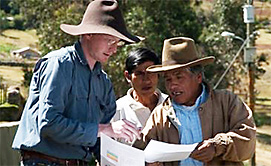Sixth Prize Peace Corps Fund Award: “A Nice Black Shirt” by Nathan Hecht (Peru)

Nathan Hecht
Nathan Hecht (Peru 2012-15) was a Peace Corps Volunteer in the high Andes Mountains near Huaraz, Peru. Nathan worked on projects to promote community environmental management, including reforestation through agroforestry, trash management, environmental education, and, in his third year, climate change adaptation and water quality monitoring with The Mountain Institute.
Originally from La Crosse, WI, he is now a graduate student at the University of Minnesota studying sustainable agriculture and diversified farming systems.
•
A Nice Black Shirt
by Nathan Hecht
“I DON’T HAVE a nice, black shirt.”
A familiar feeling of anxious uncertainty rose as I realized I didn’t know if Quechua people even wore black to funerals.
“White is okay, Natan,” my host mother said kindly, “for the angels.”
My mind grasped at thoughts of training on cultural integration, the historical influences of Christianity in Peru, the Spanish word for “condolences,” as I brushed a layer of dirt off my black dress-shoes.
I walked outside with my host mother to join the extended family, past squealing guinea pigs and heaping mounds of peels from thousands of potatoes. The community had started to gather outside our home in preparation, greeting each other as warm smoke from the cook fires wafted over to us. Huge, steaming vats of potatoes, mutton, and llunca — cracked wheat soup — were propped up on adobe bricks, dwarfing the shiny coffin that my host mother and her siblings would carry down the steep mountain path.
“Bring your machine to take pictures, Natan,” my host mother urged me, as she always did on special occasions. But this time, her voice broke with desperation. With longing to somehow capture this moment, to keep a tomorrow without her mother from ever dawning. I tried to stop time for her. I scrambled ahead of the procession, freezing images of billowing, black shawls and bright, colorful mantas, keeping playful children laughing forever, stopping tears in their tracks as they rolled down wind-cracked cheeks.
Hundreds of weary feet reached the brick walls of the cemetery, and we filed in through the short, metal door. I tried, at first, to stay in the corners, to not get in the way. But my host mother would keep calling me over, pointing where to stand, handing me endless bread or crackers or soda, just as so many others had done over these years, making me feel welcome, offering me a home in the mountains. And I watched her chest rise with grief and her eyes fill with sadness as she let the words of her mother’s passing wash over her in sorrow. I saw her, then, with her long braid and her rainbow manta tied over a black sweater. This woman who had kept me company for long hours around the dimming cook stove. This woman who I’d seen cradle newborn rabbits and butcher sheep. This woman who could not stop laughing after pushing my face into my birthday cake. Who teased me endlessly, banging on the bathroom door or on my bedroom window to make me jump, giggling triumphantly to herself. This woman, who had taken care of me when I was sick, tending my hurt and curing my loneliness. This woman, who would admit, sobbing, that I had been like more than a son to her: a blessing, and a friend. I saw her, then, as a child, lost, needing comfort, asking why, why, and wanting her mother to answer and wipe away her tears.
We need each other. Across borders and oceans, we all feel the same joy and the same pain. And in times of grief, what do we have but enduring love? Love to wrap bright colors around mourning black, to let laughter balance tears, to receive help and offer it back to the world a hundred times over. Love for this woman, mother, who found space even in her despair to reassure me that difference didn’t matter, as long as we were all together.
•
A very touching story. That last paragraph is worth reading several times over. It’s so true.
I experienced a similar situation when my Peace Corps training mother’s mother was gravely ill and eventually passed away in 1977. Then, more recently, my Costa Rican mother-in-law passed away. My wife and I were there to say goodbye and for the nueve días of mourning. The death of a loved one is such a profound shared experience, it brings us together across any cultural divides.
NICE, Nathan!
What was the prize?